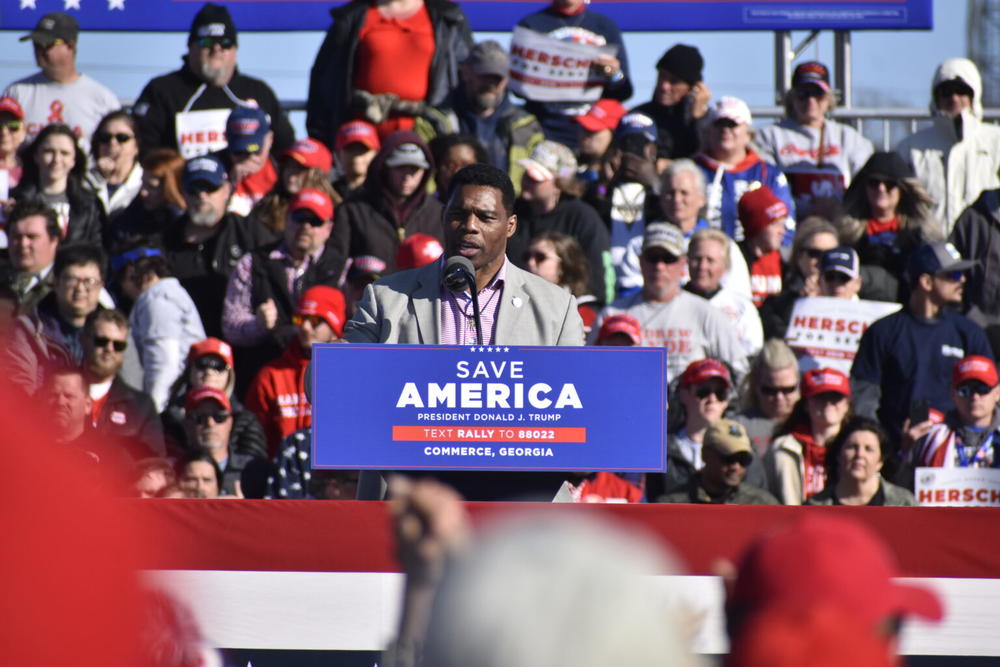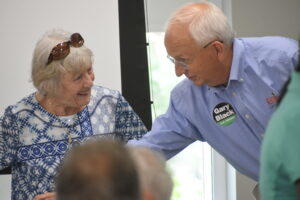
Caption
Herschel Walker has the lead in the race to become the Republican nominee for U.S. Senator from Georgia, but critics say he may not be able to go the distance in the general election.
Credit: Ross Williams/Georgia Recorder

Herschel Walker has the lead in the race to become the Republican nominee for U.S. Senator from Georgia, but critics say he may not be able to go the distance in the general election.
While a bluegrass band serenaded voters chowing down on ribs and pulled pork sandwiches Thursday evening, Gary Black walked from table to table making a last-minute pitch for support to make him Georgia’s next U.S. senator.
“These are very serious things,” he said at a campaign stop at the Vinings Bank in Smyrna. “This is not a reality show, a game show. It’s not a football game. I believe for most Georgians it is not. So, I put my trust in the voters to say ‘How can we win this race? How we go forward and serve Georgians with honor and dignity over the next six years?'”

Gary Black speaks with a supporter at a campaign event in Smyrna.
Black, Georgia’s commissioner of agriculture, is one of six Republicans and two Democrats with eyes on the Senate, but most of the attention has centered around two men: incumbent Democratic Sen. Raphael Warnock and University of Georgia football great Herschel Walker, a Republican. Walker, a friend and supporter of former president Donald Trump who has the former president’s endorsement, has parts of the state’s conservative base jazzed to go cast their ballots. But other Republicans worry he will not be nearly as appealing to a general electorate.
“If I’m the nominee, I’ll make the race about Raphael Warnock and Joe Biden and their record, because it’s not acceptable, I think, to the vast majority of Georgians,” Black said. “If Herschel Walker is the nominee, the race will be about Herschel Walker from June to November, and we’ll lose.”
The candidates in the race who did not lead UGA to a national championship have cried foul over Walker’s perceived reticence to appear on the debate stage or put forth a concrete platform.
Latham Saddler, a veteran and former intelligence official running as a Republican, compared Walker’s approach to what he called the “Biden basement strategy,” hoping to coast to a win based on name recognition alone.
“We had five straight debates and forums, they had an empty podium at every single one of them,” Saddler said at a campaign event in Rome on Tuesday. “When voters learn about that, they don’t respect that, because they know that that’s not going to get the job done against Raphael Warnock in November.”
Saddler is hoping that when the dust settles, he’ll be in second place and the multitude of other candidates will prevent Walker from winning more than 50% of the party primary vote by Tuesday, forcing him into a runoff.
“Herschel’s celebrity, once I have him in that head-to-head, all of a sudden becomes my greatest asset,” Saddler said. “Because as an outsider to politics, whatever gap I have left in name ID is going to vanish overnight, and all eyeballs are going to be on ‘who’s this guy that just brought football celebrity Herschel Walker into a runoff?’”

Latham Saddler speaks with supporters in Rome.
But forcing a runoff would require the second-place candidate to significantly outperform recent polling, which predicts Walker holds a significant lead.
Those polls are hard to ignore, said Andra Gillespie, political science professor at Emory University.
“The fact that it’s different kinds of polls, public polls and partisan polls, polls with sampling methodologies I trust and ones whose sampling methodologies I don’t trust, they all come up with the same numbers,” she said. “I don’t see how someone could think they could get Walker below 50%.”
“As a political scientist, the answer is always ‘it comes down to turnout,’ like, who actually shows up and votes,” said Georgia State University political science professor Amy Steigerwalt. “But at least for right now, if the polls are at all accurate, the next closest person to Herschel Walker is Gary Black, and I don’t think he’s even made it into double digits.”
A Real Clear Politics average of recent polling data shows Walker with 63.6% of the Republican primary vote, enough to easily avoid a runoff.
Black took an average of 7.7% of the vote in the poll, Saddler earned 3.1% and the rest of the candidates came in at less than 3%.
“I think this is going to get called really early on election night,” said UGA political science professor Charles Bullock. “It may be the first thing statewide that does get called.”
Normally, a party would be thrilled to be running a candidate with Walker’s name recognition and popularity, but many Georgia Republicans are keeping their champagne on the rack.
Despite Walker’s exploits on the football field, his past includes troubled times. An ex-wife told news outlets he had violent tendencies and on one occasion pointed a gun to her head and threatened to shoot her. Walker has admitted to having unusually violent thoughts for which he has sought help.
Walker has spoken openly about his diagnosis of dissociative personality disorder, formerly called multiple personality disorder, a mental illness that can cause changes in behavior.
In addition, an Atlanta Journal-Constitution investigation raised questions about his story of business success, finding evidence of millions in unpaid loans and documents contradicting Walker’s statements about his finances.
Influential Republicans have openly expressed their concerns about Walker.
In a recent interview with ABC’s Nightline, Georgia Lt. Gov. Geoff Duncan said Walker needs to do more to address concerns about his past.
“If he doesn’t, then I think it’s going to be a tough day in Georgia when we get to the November election, and we’re going to send, unfortunately, another Democrat to represent us as a U.S. senator,” Duncan said.
Conservative radio host Erick Erickson, who recently announced that he voted for Saddler, has also been among those doubting Walker’s viability against Warnock.
“You don’t want to ding a guy because he’s been open with his mental health struggles, but at the same time, you do have to ask yourself what will the Democrats do in the general?” Erickson said during a program last year. “You know they’re going to pull out the stops, and the media is going to help them destroy Herschel Walker. The guy is going to go from the hero of the state of Georgia in football to half the state immediately hating him because he runs as a Trump-loving Republican — Donald Trump lost Georgia, it wasn’t stolen, he lost it — and then it’s going to go downhill from there.”
Senate Republican Minority Leader Mitch McConnell believes that his party could regain control in the midterms, saying in mid-April that the “atmosphere for Republicans is better than it was in 1994.”
“Which leads you to ask the question, ‘How could you screw this up?’ It’s actually possible, and we’ve had some experience with that in the past,” he said during an event at the Kentucky Chamber of Commerce.
McConnell cautioned that GOP primary voters shouldn’t vote for primary candidates who are “unacceptable to a broader group of people.”
But he added he was optimistic that GOP voters in states including Georgia would end up with “fully electable nominees.”
Warnock’s victory during the January 2021 runoff election was especially close. He secured 51% of the vote to former GOP Sen. Kelly Loeffler’s 49%. The two were separated by 93,272 votes.
Warnock and Sen. Jon Ossoff’s victories in the January 2021 runoff contest against two incumbent Republicans gave Democrats unexpected control of the U.S. Senate.
This year’s general election is expected to be just as tight a race and could, once again, see Georgia voters determine control of the U.S. Senate.
A SurveyUSA poll for 11Alive conducted in late April found Warnock held 50% of the vote to Walker’s 45%. Pollsters found that Warnock had the support of 95% of the Democratic base, but Walker only had the support of 84% of Republicans, 9% of whom said they would cross over to support Warnock.
That’s not to say Warnock has a return to Washington sewed up. An Emerson College poll for The Hill conducted in early April gave Walker 49% of the vote to Warnock’s 45%, with 6% undecided.
With no serious primary challenger, Warnock has been quietly filling up his campaign war chest in preparation for his likely battle against Walker. According to Federal Election Commission filings, he’s got $22.9 million on hand compared with $7.1 million for Walker.
“This is going to be one of the marquee Senate races, and the fact that Warnock is raising as much money as he is just shows the competitiveness of this race, and that he knows he has to amass resources,” Gillespie said. “If he thought he could take Walker in a cakewalk, he wouldn’t need that type of robust fundraising.”
Some of that fundraising gap will likely be filled in after the primary, Gillespie said.
“When Walker wins the nomination, we’re going to see Republicans line up to support him as well,” she said. “There’s a lot of incentive for Republicans to try to win the seat, because they want control of the Senate, and this is one of the places that they’re going to want to try to do that.”
Warnock has other advantages, Bullock said. As a preacher, he knows how to express ideas fluently, and he’s had plenty of time to think on issues and refine his messaging.
“He’s spent the last two years sitting around listening to people and participating himself in talking about public policy,” Bullock said. “On a whole range of issues, he’s going to have some kind of position that he’s developed and is able to articulate. Unless Herschel has been studying his playbook, and I’m sure his handlers have been trying to get him to, he’s not going to have much to say on many of these issues, and indeed on some of them, he’s going to have nothing to say. What usually happens when you put a challenger beside an incumbent and they have to answer questions is the incumbent comes out looking better.”
Those skills could come in handy in a general election in which conservative bona fides don’t mean much to many people, Steigerwalt said.
“It’s just not appealing to the party faithful, it’s appealing to those who might sort of think of themselves as Republicans, but they don’t really pay a lot of attention and they’re not turning out in primaries,” she said. “It’s appealing to those who are moderates, particularly, we know that there are a lot of people who are Republicans but not very supportive of Trump, it’s all of these things together.”
A hypothetical matchup between Walker and Warnock could come down to whether Georgia’s moderate Republicans decide to toe the party line, hold their nose and cross sides or leave the spot blank.
Saddler vowed to support the Republican nominee no matter who it is, but Black would not make that commitment, citing concerns about voting for someone facing accusations of domestic violence.
“I’ve got a wife and daughter,” he said. “When are we going to stand up for those principles in the Republican Party? We’re for family values. We’re for supporting law enforcement. Herschel has got a past that he has not answered for or explained adequately.”
This story comes to GPB through a reporting partnership with Georgia Recorder.